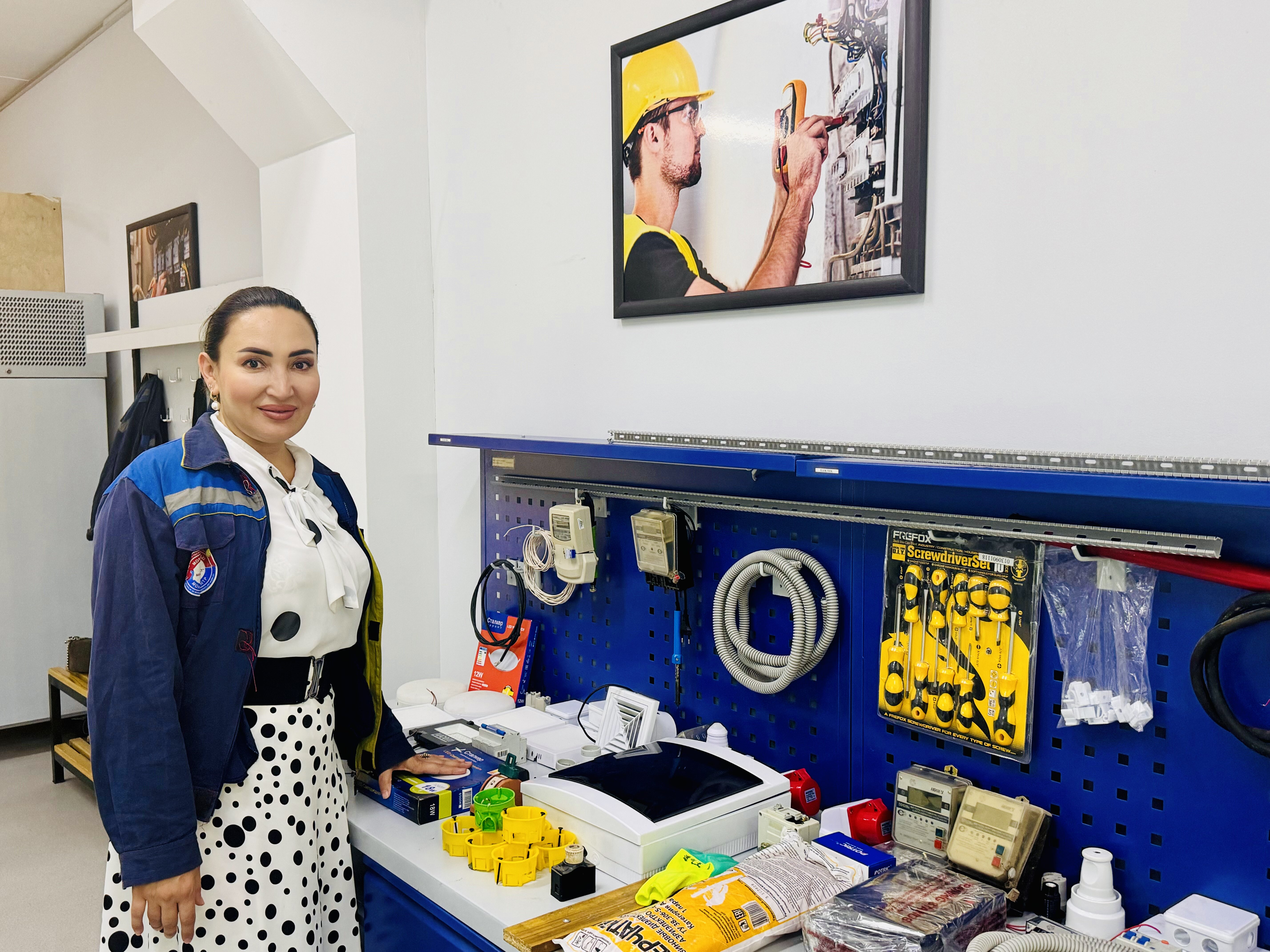Author: Guzal Fayzieva
"Unfeminine Profession" – Breaking Stereotypes on the Path to Energy Efficiency
September 18, 2024

In Namangan, a female electrician teaches others how to install solar panels.
Hammering a nail, screwing in a light bulb—these are tasks we typically turn to men for. But not for Mamlakat Ikramova, the heroine of our story, who not only changes light bulbs on her own but also tackles more complex electrical tasks. She skillfully explains how electricity is supplied to residential and industrial buildings. Electricity is at the heart of her profession, one she chose in her youth when she enrolled in the Faculty of Electrical Energy at the Namangan Engineering and Pedagogical Institute. She was one of only three women among the many students in the course. Her natural confidence and determination led her into this male-dominated field.
Her fascination with electricity began in childhood, sitting next to her father as he repaired a broken tape recorder. With just a few simple actions, he brought familiar songs back to life. That was when Mamlakat realized that electricity was everywhere — powering her favorite TV shows, lighting up her home, and even manifesting as lightning in the sky. Electricity had given rise to many professions: electricians, electrical fitters, electrical engineers. Mamlakat went on to master one of them to perfection.

“There were only three girls in our class, but our male classmates always treated us with respect and valued our contributions. I remember that some of the toughest subjects were Strength of Materials and Electrical Engineering, but I managed to get the highest grades,” Mamlakat recalls. “Since I was a child, I’ve been very goal-oriented and never afraid of stereotypes.”
However, gender stereotypes, especially in more traditional provinces, still persist. Many women, even after completing their studies, set aside their diplomas to focus on family responsibilities. Pressured by relatives who believe that family should come first, some women remain unfulfilled in their careers, let alone aspire to leadership positions. Mamlakat, however, successfully balanced building a family with two children and earning recognition in the challenging field of electrical engineering. Today, she works as an Electrical Engineering Teacher at the Namangan "Ishga Markhamat" mono-center. While most of Mamlakat’s students are men—some of whom initially viewed her with skepticism — they now respectfully call her “ustoz,” meaning teacher.
The main goal of the “Ishga Markhamat” mono-centers, located in each region of Uzbekistan, is to help the unemployed by providing professional training in various trades. The key advantage of these centers is the focus on practical skills training. The certificates they issue upon course completion are equivalent to diplomas from specialized secondary education institutions.
Under Mamlakat's guidance, her students quickly acquire electrical engineering skills, enabling them to work in the field and carry out tasks such as laying cables, installing outlets, and repairing electrical systems and equipment. Recently, the curriculum expanded to include solar panel installation, thanks to support from the United Nations Development Programme (UNDP), which implemented the “Market Transformation for Sustainable Rural Housing in Uzbekistan” project in collaboration with the Ministry of Construction and Housing and Communal Services of Uzbekistan, and with financial backing from the Global Environment Facility (GEF).

“The biggest advantage of solar panels is their accessibility. Both the panels and the sun are free to use. The only costs involved are for purchasing and installing the panels. For many in rural areas, this is still a relatively new concept, but it’s a missed opportunity. We know that people in rural areas often struggle with electricity supply, and using free, clean solar energy is the best solution,” says Mamlakat. “I believe we all need to think globally. Alternative energy sources like solar panels and heat pumps not only save money but also help preserve nature for future generations and combat climate change.”
At present, not all local specialists are trained to work with solar panels and other energy-efficient technologies. To address this gap, UNDP organized a series of trainings in October-November 2023 for teachers at regional "Ishga Markhamat" mono-centers, equipping them to train electricians and plumbers in renewable energy. In August-September 2024, UNDP provided the necessary educational equipment, manuals, and models of solar panels and solar collectors to 16 regional "Ishga Markhamat" centers across the country. These life-sized models have been an excellent resource for practical lessons, and students in Namangan have already benefited from them.

“It’s better to see something once than hear about it a hundred times,” says Ayub Rakhmanov, a student at the mono-center. “Learning through practice is always more effective. Things might sound simple in theory, but it’s when you actually see and work with solar panels that you really understand how they work. Now, with these new educational models, we can get hands-on experience right here at the center. After completing the course, I can confidently say I can install solar panels, in addition to my other skills. A jack of all trades, you know.”
Sunlight streams into Mamlakat’s classroom, where her students are jotting down notes for their next lesson: “Solar Panels and How They Work.” Now, they see the sun shining outside not just as a natural phenomenon, but as a potential source of income and comfort. And they see their teacher—an expert in electrical engineering—as a living embodiment of Sustainable Development Goal 5: “Achieve gender equality and empower all women and girls,” a call to eliminate discrimination against women everywhere.

“Whether we are women or men, we are individuals first and foremost, and we should have equal rights. Using labels and stereotypes is outdated thinking. We are all unique and shouldn’t live by a single template. The real limitations are only in our minds, because every person, regardless of gender, should rely on themselves. That’s what self-sufficiency means,”says Mamlakat Ikromova.

 Locations
Locations